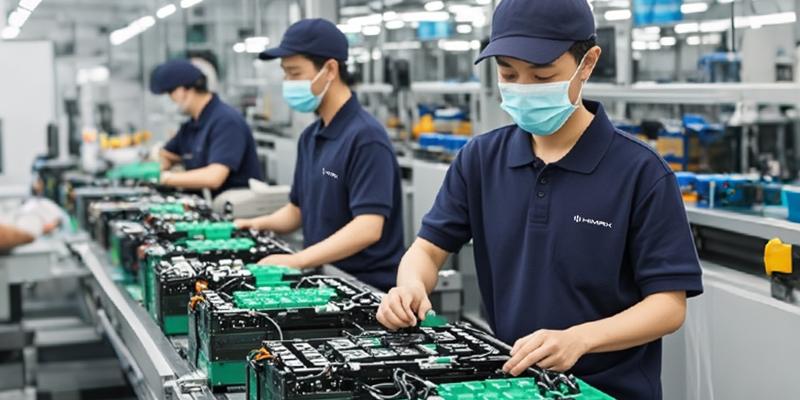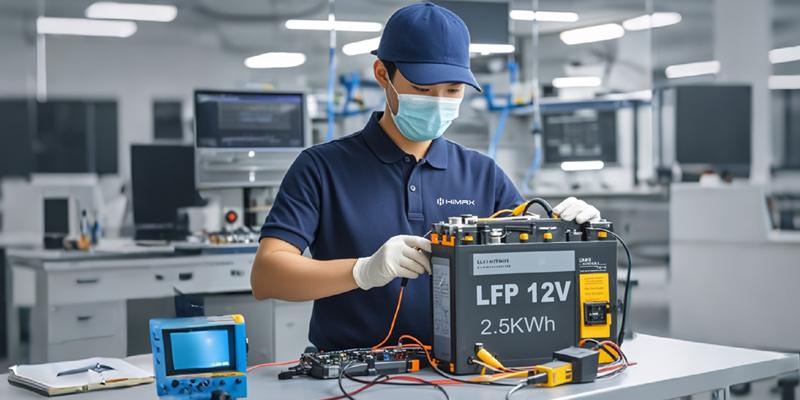In today’s fast-growing battery market, sourcing the right wholesale supplier is crucial for the success of your business. Whether you are dealing with lithium-ion, LiFePO4, or any other types of batteries, a reliable supplier ensures that you have access to high-quality products that meet your specifications. In this guide, we will dive deep into how you can find reliable battery wholesale suppliers in the USA, focusing on the key considerations, potential risks, and ways to establish long-term partnerships with dependable vendors.

Key Factors to Consider When Choosing a Battery Wholesale Supplier
Finding the right supplier involves a thorough assessment of several important criteria. By paying attention to these aspects, you can make an informed decision and ensure your business thrives in the competitive battery market.
- Supplier Qualifications and Certifications
One of the most important factors to consider when selecting a battery supplier is their qualifications and certifications. Batteries, especially lithium-ion and LiFePO4 types, require strict adherence to safety standards and regulations. Here are some of the certifications and regulatory approvals that you should look for in a supplier:
- UL Certification: UL is a global safety certification company that ensures the safety, performance, and compliance of electrical products. Make sure your supplier’s batteries are UL-certified to guarantee product safety.
- CE Certification: This is crucial for businesses operating in or importing into Europe. It signifies that the products meet the European Union’s health, safety, and environmental protection standards.
- ISO Certification: ISO certifications, especially ISO 9001 (Quality Management System), indicate that the supplier follows standardized processes in manufacturing, quality control, and business operations.
These certifications not only show compliance with legal standards but also build trust between you and the supplier. A qualified and certified supplier significantly reduces the risk of faulty products and ensures that the batteries you purchase meet industry standards.
- Supply Chain Stability
A stable supply chain is vital for any business, especially in industries like batteries where technology and demand change rapidly. When assessing a supplier, ensure that they have a proven record of supply chain stability. Some questions you should ask include:
- What is their production capacity?A supplier should be able to meet your demand without frequent delays.
- What are their lead times?Timely deliveries are crucial, particularly if your business operates with just-in-time inventory systems. Suppliers with shorter lead times and reliable logistics ensure that your stock levels are always optimal.
- Do they have backup plans for supply chain disruptions?The recent global supply chain disruptions have shown that a resilient supplier is one that has contingency plans in place, such as alternative transportation routes, additional storage facilities, and diversified sourcing of raw materials.
By confirming these aspects, you can secure a stable flow of batteries for your business without unnecessary interruptions.
- Product Quality and Technical Support
Battery quality varies significantly among different manufacturers. It is important to work with suppliers that deliver consistent quality across their entire product line. Poor-quality batteries can not only damage your reputation but also lead to customer dissatisfaction, increased return rates, and even safety hazards.
- Conduct Sample Testing: Before making a large purchase, always request samples. Test these samples thoroughly to ensure they meet your specifications in terms of performance, lifespan, and safety.
- Ask for Technical Support: A reliable supplier should offer technical support to assist you with product-related inquiries. This could include technical data sheets, safety information, and instructions on installation or maintenance.
Long-term partnerships are often built on a shared commitment to quality, so look for suppliers that are open to quality audits and continuous improvements.
- Pricing Strategy and Cost-Effectiveness
While pricing is a critical factor in any purchasing decision, it should not be the only criterion. The cheapest supplier is not always the best. Look for a supplier that provides a balance between price and quality. Consider the following:
- Bulk Discounts: Many suppliers offer discounts on large orders. Find out what thresholds are needed to access these discounts, and whether you can negotiate better rates for long-term contracts.
- Long-Term Cost Efficiency: Sometimes, paying a slightly higher price for better quality can save you money in the long run. Lower defect rates, fewer returns, and longer-lasting products can lead to lower operational costs.
Understanding the pricing structure and negotiating favorable terms can help you maximize your profit margins while ensuring a steady supply of high-quality batteries.
Main Channels for Finding Battery Wholesale Suppliers
There are several ways to connect with reputable battery suppliers, whether you prefer local partners or want to explore international options.
- Industry Trade Shows and Expos
Industry trade shows are an excellent way to meet potential suppliers face-to-face. Events like the Battery Show North America, CES (Consumer Electronics Show), and other industry-specific expos give you the chance to interact with manufacturers and suppliers, learn about the latest trends, and establish direct contacts.
- Advantages: Personal interaction allows for a better understanding of the supplier’s capabilities. You can ask detailed questions, request product samples on the spot, and assess the supplier’s professionalism.
- What to Look For: At trade shows, make sure to inquire about the supplier’s production capacity, certification, and product portfolio. Also, take note of how well they present their products and whether they offer clear documentation and technical details.
- Online Wholesale Platforms
If attending trade shows is not feasible, online wholesale platforms like Alibaba, Global Sources, or ThomasNet are popular alternatives. These platforms list thousands of suppliers, complete with reviews, ratings, and sometimes certifications.
- Advantages: You can compare multiple suppliers, filter them by certification, and even communicate directly through the platform. Some platforms also offer secure payment methods that protect you from fraud.
- What to Look For: Ensure that suppliers have detailed listings with clear product specifications, certifications, and positive reviews. Contact the suppliers for additional information, and always request samples before placing bulk orders.
- Local vs. International Suppliers
Both local and international suppliers come with their advantages and challenges.
- Local Suppliers: Sourcing from within the USA ensures that you comply with local regulations, reduces shipping costs, and shortens delivery times. Local suppliers are also easier to visit and audit.
- International Suppliers: International suppliers, particularly from China, often offer more competitive pricing due to lower production costs. However, consider the additional lead times, potential language barriers, and the need for thorough due diligence to avoid issues related to product quality or shipping delays.
Depending on your business model, you might find that a mix of both local and international suppliers best suits your needs.
Managing Risks When Partnering with a Supplier
There are always risks involved when working with new suppliers. To minimize these risks, follow these best practices:
- Identifying and Avoiding Unreliable Suppliers
Before finalizing any partnership, conduct a thorough background check. Here’s how you can avoid unreliable suppliers:
- Check for Red Flags: Suppliers that cannot provide certifications, refuse to share client references or have no verifiable online presence are potential red flags.
- Verify Business Registration: Confirm the legitimacy of the business by checking its registration details. In the U.S., this can be done through business registries or the Better Business Bureau (BBB).
- Customer Feedback and Reviews: Always check customer feedback, both on and off the supplier’s website. Use third-party platforms or ask for references from other clients to ensure their authenticity.
- Contract Terms and Risk Mitigation
Ensure that all terms are clearly outlined in the contract. Key elements include:
- Quality Assurance: Specify the expected product quality and testing methods.
- Delivery Terms: Clarify lead times, penalties for late delivery, and shipping responsibilities.
- Dispute Resolution: Include clauses on how disputes will be handled, including recourse for faulty products, missed deadlines, or breaches of contract.
A clear contract protects both parties and reduces the risk of misunderstandings that could lead to financial loss or supply chain disruption.
Case Studies: Successful Supplier Partnerships
Let’s look at examples of businesses that have successfully partnered with reliable battery suppliers:
- Case Study 1: A U.S.-based startup that sources lithium-ion batteries for electric bikes. By attending industry trade shows, they connected with a reliable local supplier that offered UL-certified products and competitive pricing. Over a two-year period, their defective return rate dropped by 30%, and their revenue increased by 20%.
- Case Study 2: A solar energy company that initially struggled with inconsistent international suppliers. After shifting to a U.S.-based wholesaler with ISO-certified batteries and guaranteed lead times, the company reduced inventory costs by 15% and saw a 50% increase in customer satisfaction.
These success stories highlight the importance of finding a supplier that meets your business’s specific needs.

Himax Electronics: Your Trusted Battery Wholesale Supplier
At Himax Electronics, we understand the importance of reliable, high-quality battery products. With a focus on lithium-ion and LiFePO4 battery technology, we offer a wide range of products that meet the highest industry standards, including UL and CE certifications. Our customers benefit from:
- Comprehensive Technical Support: Our team of experts is available to assist you with product selection, technical queries, and after-sales service.
- Custom Solutions: Whether you are looking for customized battery packs or specific performance requirements, we tailor our offerings to meet your needs.
- Reliable Supply Chain: We pride ourselves on our strong manufacturing capabilities, ensuring that your orders are delivered on time and meet your quality expectations.
Partner with Himax Electronics to secure a reliable battery supply for your business and take advantage of our expertise in the industry.
Conclusion
Finding a reliable battery wholesale supplier is key to ensuring your business’s long-term success. By considering factors like supplier certifications, product quality, pricing, and supply chain stability, you can avoid the risks of unreliable suppliers and secure a partner that contributes to your business’s growth. Establish a clear contract, manage risks effectively, and look for opportunities to build long-term partnerships with trusted suppliers like Himax Electronics.

